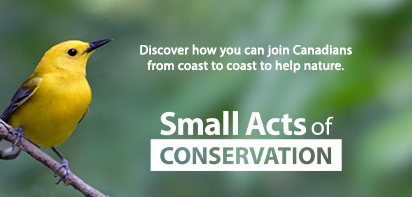Southern Norfolk Sand Plain FAQs
How the Nature Conservancy of Canada works in Norfolk County
The Nature Conservancy of Canada (NCC) is Canada's leading land conservation organization. A private, non-profit organization, we partner with individuals, corporations, other non-profit organizations and governments at all levels. We work together to protect our most important natural treasures — the natural areas that sustain Canada's plants and animals.
A science-based, long-term approach to our work makes us unique. NCC conserves habitat of the highest ecological value. Our on-the-ground stewardship activities aim to protect and enhance these habitats for the animals and plants that rely on them.
NCC's experienced land managers work with members of the community, local conservation organizations, academic institutions and all levels of government.
In Norfolk County and across Ontario, NCC relies on the expertise of its Ontario Science Advisory Network. The network consists of respected conservation experts and professionals who are available for consultation on science and conservation planning matters.
How does land conservation improve our environment?
NCC works to conserve, restore and maintain important natural landscapes. These lands filter the water we drink and the air we breathe. Healthy forests, prairies and oak savannahs are carbon sinks. They act like lungs, absorbing carbon dioxide and producing oxygen. Scientists around the world agree that these carbon sinks play a key role in moderating the effects of global climate change.
Wetlands and natural corridors along rivers, creeks and streams help prevent flooding. They also filter out contaminants and help maintain good water quality. In an agricultural setting, these undeveloped natural landscapes also provide habitat for insect pollinators required for crop production and pest control.
How does NCC prioritize and acquire lands?
The lands of interest to NCC in Norfolk County are ecologically significant at the provincial and national levels. They contain habitat for rare and at-risk species and connect existing conservation lands. NCC acquires these lands through direct purchase at fair market value, donations, bequests and conservation agreements (easements).
What does NCC do with the land?
NCC manages, maintains and enhances the natural values of the properties we acquire. The first thing we do when we conserve a new area is to document the plants, animals and ecosystems and condition of the property. This information is then tracked over several years.
Managing land in Norfolk County includes many activities, such as:
- agricultural field restoration with native species to encourage the return of native Carolinian forests and grasslands, improve biodiversity and provide pollinator and endangered species habitat;
- wetland creation to provide habitat for wetland species, restore natural water flow, reduce flooding and improve ground water recharge; and
- control non-native, invasive species, such as autumn olive, common reed and garlic mustard, which cause declines in biodiversity and harm native species.
What about hunting?
Hunting has a long history in Norfolk County. It is a traditional activity with deep cultural roots. NCC recognizes the important role hunters play in maintaining a healthy balance in wildlife populations. Hunting and fishing with written permission is allowed on the majority of NCC lands in Norfolk County. Access is limited to regulated hunting seasons, bag limits and legal shooting times. Hunters are required to park at the locations designated on their permission letter.
For information on how to receive written permission for hunting access, please email ontario@natureconservancy.ca or call 1-866-281-5331.
Can the public access NCC lands?
NCC lands are open to the public. We invite you to explore nature in your neighbourhood. Hiking trails are managed and maintained on the Lake Erie Farms property and Backus Woods and adjacent properties. For individuals with mobility challenges, NCC offers motorized guided tours of Backus Woods.
NCC and partners offer educational tours of our properties to community groups and other organizations. NCC’s purchase of the Backus Woods property has also helped fund educational programming at the Long Point Region Conservation Authority’s Conservation Education Centre, to ensure that local youth learn about and appreciate Norfolk’s native species and ecosystems.
How does NCC contribute to the economy?
NCC invests in the local economy by hiring qualified community members and local contractors to carry out activities. These can include fencing, trail maintenance, wetland restoration, plantation thinning and other projects. NCC tries, when possible, to purchase supplies, gas and accommodations locally. Depending on the season, up to 10 NCC staff live, work, shop and play in Norfolk County.
NCC is a significant taxpayer in Norfolk County. Where a property has been restored and is no longer eligible for the farm tax rate, NCC uses other programs such as the Managed Forest Tax Incentive Program. This program allows the land to be taxed at the same rate as an agricultural property. NCC may enroll newly acquired properties in the Conservation Land Tax Incentive Program — a tax-reduction program that is widely used by private landowners in Norfolk County who are conserving important ecological habitats.



